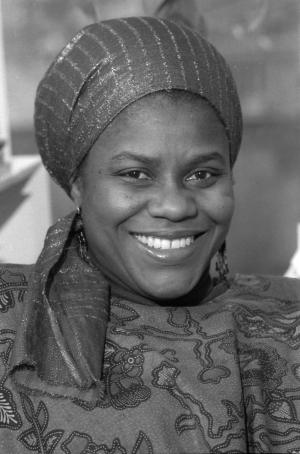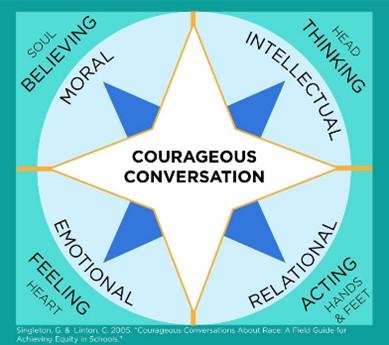“When We Sing, We Announce Our Existence”: Bernice Johnson Reagon and the American Spiritual'

In this lesson students will explore the power of music through the words of Ella Baker and the work Bernice Johnson Reagon. Students will first start with a Do Now image of Ella Baker to activate prior knowledge. From there, students will complete a Song Analysis Activity (see handout) of Ella’s song from Sweet Honey in the Rock or Resistance Revival Chorus.
Finally, students will read an excerpt from an essay written by Bernice Johnson Reagon and the power of song. Students will be asked to make connections between the essay and Ella’s song.
To conclude as an assessment, students will check in on the Courageous Conversation Compass and write a brief reflection on their learning.
Guiding Question : How can music be used as a tool to liberate, connect, and strengthen resolve in the face of injustice?
30 minutes
Conduct a textual analysis of a prominent song (Ella’s song) and writing from Bernice Johnson Reagon, extracting their inherent meanings and values to better comprehend their significance in advancing social justice in the past and present.
Students should be familiar with the broader Civil Rights movement, Ella Baker (to be covered in the Do Now), and contemporary Civil Rights movement and protests. As part of the Social Emotional Learning component, students may be familiar with Courageous Conversation Compass.
- Ella’s Song (performed by Sweet Honey in the Rock): https://www.youtube.com/watch?v=U6Uus--gFrc
- Ella’s Song (performed by Resistance Revival Chorus): https://www.youtube.com/watch?v=aYmaOzaGI-Q
- Ella’s Song Lyrics: http://thue.stanford.edu/jacquie/songs/ella.html
- Courageous Conversation Compass (Adapted from Glenn Singleton’s Courageous Conversations About Race: A Field Guide for Achieving Equity in Schools, 2nd Edition (2015):

- PBS Essay by Bernice Johnson Reagon: https://www.pbs.org/wgbh/americanexperience/features/eyesontheprize-music-civil-rights-movement/
- Ella Baker Image, American Public Media https://americanradioworks.publicradio.org/features/blackspeech/images/ebaker.jpg
- Song Analysis Handout
- Bernice Johnson Reagan Essay
-
Do Now: Teacher will show picture of Ella Baker from materials. Students will be asked to complete a KWL chart
-
Teacher will break students into small groups to watch one of two videos (either Sweet Honey in the Rock or Resistance Revival Chorus’s performance). Teacher will share that “Ella’s Song” descends from the words of civil rights activist Ella Baker, which were turned into an a cappella piece written by Dr. Bernice Johnson Reagon and performed by the ensemble Sweet Honey in the Rock. Students should fill out the attached Song Analysis Activity handout at this time.
-
Students will be given one of the seven attached excerpts from the article “Music in the Civil Rights Movement” by Bernice Johnson Reagon. Students will be asked to share one key idea, thought, or question from the excerpt they were assigned in small groups (After students have complete their excerpt, they should be put in small groups with people who read different excerpts)
-
Students will complete the Assessment (see Assessment/Homework Section). If there is remaining time, student can be asked to share with the class where they are now on the Courageous Conversation Compass.
Student Journal Exercise (and allow time for student share out):
-
After reading the interview and listening to the lyrics, where are you on the Courageous Conversation Compass?
-
While we have studied Bernice Johnson Reagon today, music as a tool of social change and uplift is still quite common. Pick a contemporary song and juxtapose it to the work of Bernice Johnson Reagon.
This can include:
-
Additional Lesson on Civil Rights and Music: https://edsitement.neh.gov/lesson-plans/freedom-riders-and-popular-music-civil-rights-movement
-
Teaching Social Justice: It is Time Act: https://www.musicconstructed.com/tool/teaching-social-justice-its-time-to-act/
-
Bernice Johnson Reagon interview with Bill Moyers: “This Little Light of Mine: https://billmoyers.com/2013/05/03/moyers-moment-1991-bernice-johnson-reagon-on-this-little-light-of-mine/
D2.Civ.5.9-12. Evaluate citizens’ and institutions’ effectiveness in addressing social and political problems at the local, state, tribal, national, and/or international level.
D2.Civ.14.9-12. Analyze historical, contemporary, and emerging means of changing societies, promoting the common good, and protecting rights.
D2.Civ.10.9-12. Analyze the impact and the appropriate roles of personal interests and perspectives on the application of civic virtues, democratic principles, constitutional rights, and human rights.
D2.His.3.9-12. Use questions generated about individuals and groups to assess how the significance of their actions changes over time and is shaped by the historical context.
